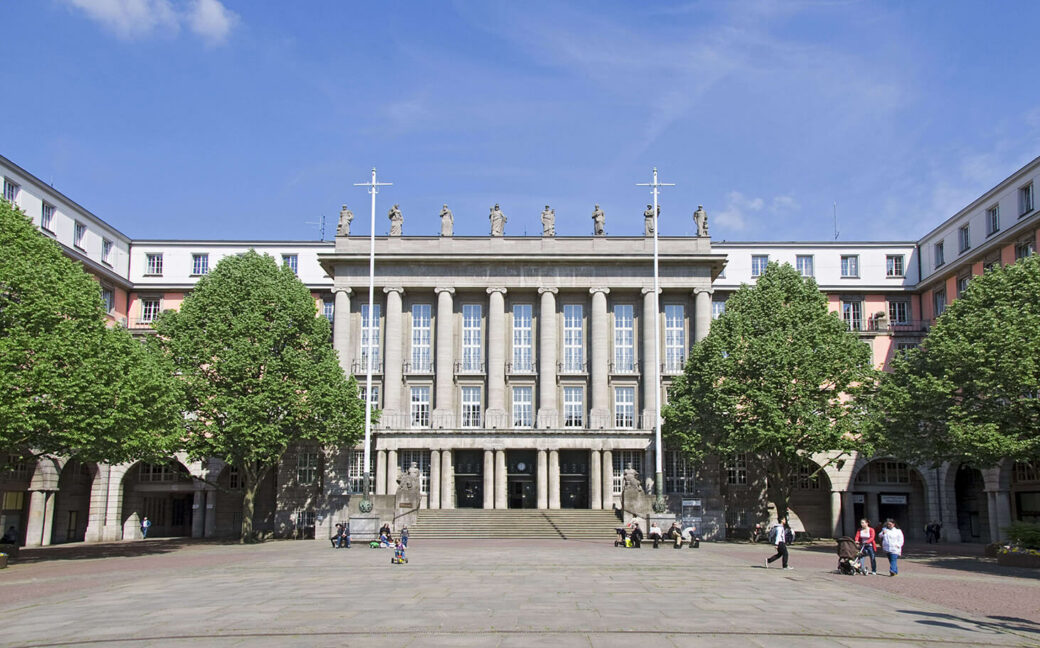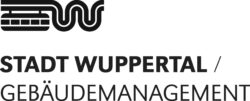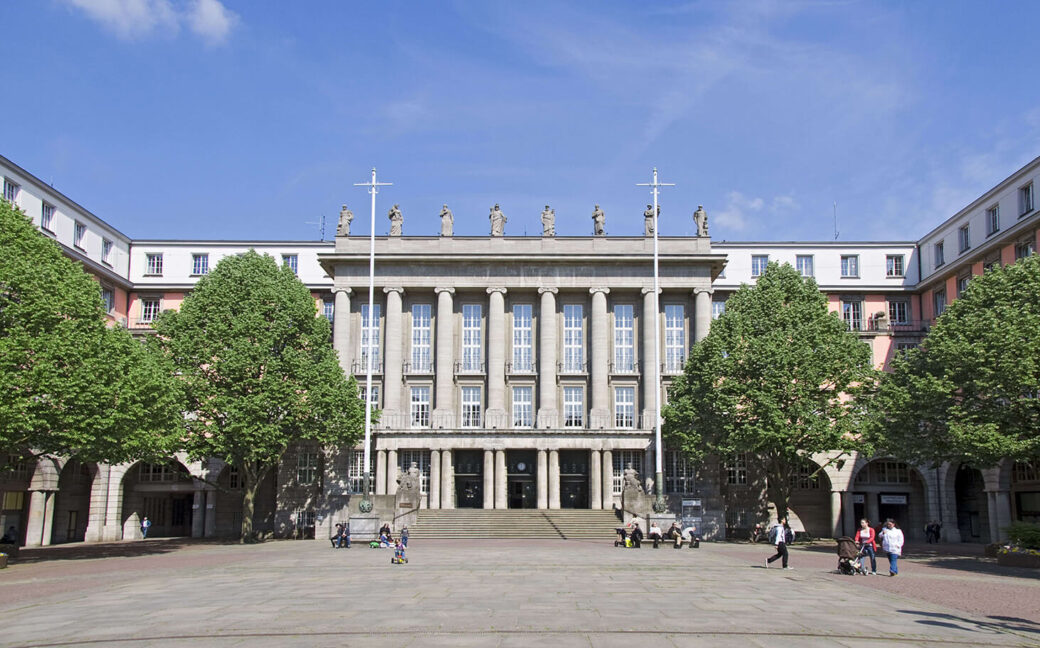Wuppertal’s Building Management Department Paves the Way for Connected Invoice Processing
Since 1998, the City of Wuppertal has operated its building management department (GMW). Today, the department employs around 480 staff and generates an annual turnover of €130 million. Organised as a matrix structure, GMW reflects the complexity of managing a large-scale municipal organisation. The city oversees approximately 400 complexes comprising 800 buildings, which are continuously expanded and maintained. At the d.velop public sector days 2023 in Kassel, the City of Wuppertal presented it’s digitally connected and cross-organisational incoming invoice processing system for building management.
Initial Situation: One Organisation, Many Construction Needs
Within Wuppertal’s building management department (GMW), staff from product management act as direct contacts for the city’s various service units. These include, for example, the School Administration Office, which is responsible for matters related to school buildings. Each unit has its specific needs and requirements, which are coordinated and fulfilled by GMW.

Since implementing digital invoice processing, we have handled approximately 85,000 invoices seamlessly and without media discontinuities
Ralf Reuter
Head of Functional Division – Building Management
City of Wuppertal
Product Management at GMW Handles Incoming Requirements
The service units receive specific requirements and forward them to the responsible product managers at the City of Wuppertal. “For example, a new extension might be needed at an all-day primary school,” explains Ralf Reuter, Head of the Building Management Division at the City of Wuppertal. “In such cases, the School Administration Office communicates its future needs to the product managers responsible for schools.”
Internal Planning in Detail – Tendering and Construction
These requests are then passed on to the relevant functional divisions. After detailed planning, the projects are put out to tender. “In a municipality of our size, there’s a large number of requests and necessities to manage,” says Reuter. In addition to these, the Building Management Department is also responsible for ensuring the ongoing operation of all buildings. The result: a significant volume of invoices – many of which require independent verification. The City of Wuppertal sought a suitable solution to integrate this external service into a digital workflow for incoming invoice processing. After all, the digital future of invoice handling in municipal organisations had already been decided.
Challenge: Digital Invoice Processing
As early as 2016, legislation was passed requiring invoices to be received electronically. “We launched a tender to digitise the invoice processes at GMW in line with EU Directive 2015/54/EU,” recalls Ralf Reuter. A detailed service specification and target definition were created for the external consulting partner. The decision was made in favour of d.velop, and a project timeline was jointly developed.

Project Title: Introduction of Electronic Invoice Processing and DMS
The detailed project plan was titled “Introduction of Electronic Invoice Processing and Document Management System (DMS)”. Ralf Reuter emphasises the importance of “clearly outlining and documenting each process step through an as-is analysis. Only then can we truly understand what it means when an invoice arrives at the city.”
Which Invoices Should Be Processed Electronically?
After completing the as-is analysis, the results were transferred into a target concept. A key step was identifying which types of invoices should be processed electronically. The outcome was a list of invoice categories: minor construction invoices, maintenance invoices, deliveries, services, and major construction invoices. From receipt to payment, each invoice at the City of Wuppertal’s Building Management Department goes through “numerous individual steps that must be considered,” says Reuter. There are three main ways invoices are received: by post, via DMS, or by email as a PDF. “For example, postal invoices must be date-stamped and entered into the automated system,” he explains.
Workflow for Automated Invoice Processing
This initiates a “what-happens-next” mechanism. “The invoice is checked for compliance with §14 of the German VAT Act,” Reuter explains. If it passes the initial check, it can be corrected, processed further, or forwarded to supervisors for approval. The electronic workflow also supports both financial and factual verification. “Since the introduction of digital invoice processing, we have processed around 85,000 invoices without any media disruptions,” Reuter proudly states. “In addition, they have been archived in a legally compliant manner within the d.velop documents management system.”

DMS Witboek
Digitaal documentbeheer eenvoudig uitgelegd
Wat moet een documentbeheersysteem kunnen? Wat zijn de voordelen van het implementeren ervan? En hoe ziet AI in documentbeheer er eigenlijk uit? Deze 35 pagina's tellende whitepaper staat boordevol deskundige kennis, inclusief praktische tips, invulbare checklists, antwoordvelden en een downloadbare korte presentatie om uw team te overtuigen van de waarde van een DMS.
Inhoud van het witboek:
- Een duidelijke introductie tot digitaal documentbeheer
- Overzicht van de zeven belangrijkste functionaliteiten van een DMS
- Speciale focus: Kunstmatige intelligentie in documentbeheer
- Stapsgewijze begeleiding voor een succesvolle implementatie van DMS
- Geavanceerde onderwerpen: Procesdigitalisering en factuurverwerking
Invoice Processing in a Three- to Four-Stage Workflow
“We successfully archived all 85,000 invoices together,” says Tobias Ahlers, Team Lead Solution Delivery at d.velop. The process followed these steps: First, a factual and/or financial verification is carried out. This is followed by the standard approval process at GMW, which is based on cost centres. In the final step, the invoice is posted. “Put simply, we implemented a three- or optionally four-stage process for handling these invoices,” Ahlers explains.
Next Step: Major Construction Invoices with External Verification
“After successfully archiving the first 85,000 invoices, we are now turning our attention to major construction invoices,” Ahlers continues. At first glance, the differences may not seem significant. However, after the initial step, an external invoice verification is integrated into the process. This could involve a partner such as an architectural or engineering firm. Only after receiving and evaluating the results does the process continue with the factual/financial verification. “From that point on, we return to the established process: approval is granted, and the invoice is posted,” Ahlers concludes.
Complete Digitalisation of Media-Free Invoice Verification
The key element is the external invoice verification. “From a technical perspective, it’s not simply a matter of sending an invoice and immediately receiving a response,” explains Tobias Ahlers. “We carefully considered how this subprocess could be implemented.” The central question: “How can a partner who is not part of the Wuppertal Building Management network work with the system?” The answer: a fully digitalised, media-free external invoice verification process. This meant that even more complex construction invoices had to be integrated into the workflow. “To achieve this, we evaluated the acceptance criteria,” says Ahlers.
One key requirement, for example, was seamless integration into the existing invoice workflow.

The case handler should remain in their familiar working environment and be able to communicate easily with the external partner.
Tobias Ahlers
Team Lead Solution Delivery
d.velop AG
Connected, Cross-Organisational Invoice Processing
The next step was to evaluate how the concept could be implemented. “The simplest idea, after consulting with the City of Wuppertal and GMW, was: we could use email,” recalls Tobias Ahlers. However, this approach had clear limitations: large PDF attachments for complex invoices can quickly reach file sizes in the hundreds of megabytes. “Either the internal mail server fails, or the external system rejects the message.” The solution was found in d.velop trust spaces – a platform for secure, cross-organisational exchange of data and documents. It replaces email and postal mail, which are not ideal in terms of security and other factors. The plan: to enable the use of d.velop trust spaces via the web client or through automated API integration. “The case handler should remain in their familiar working environment and be able to communicate easily with the external partner,” explains Ahlers.
OTC as Cloud Host for Secure Digital Networking Between Organisations
The data is hosted on the Open Telekom Cloud, which is listed by the German Federal Ministry for Economic Affairs as a “Trusted Cloud”. For staff, this means virtually no change to their familiar working environment.
New Functionality Enhances the DMS
“At GMW, this simple connection between the internal system and external partners works flawlessly,” says Tobias Ahlers. “We have the web client and the DMS server, where the workflow continues to run. When external verification is triggered, the system automatically connects to d.velop trust spaces.” The DMS, which has been in use at GMW for years, was extended with a new component to support both internal collaboration and cooperation with third parties.
Software-demo
Meer informatie over d.velop-software
Vraag met slechts een paar muisklikken uw gepersonaliseerde live demo van de d.velop-software aan. Krijg een live demonstratie van de software en stel direct uw vragen. Vul gewoon het formulier in en wij nemen contact met u op.

